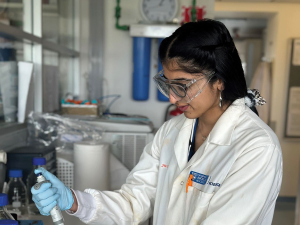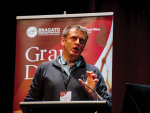Sukhpreet Kaur Gill is inspired by the amazing things that you can do with chemistry, including studies that can be applied in real life – such as wine.
Her PhD project at University of Auckland, collaborating with Bragato Research Institute, is examining the volatile sulphur compounds profile of New Zealand Pinot Noir wines. Here Sukhpreet offers some insights into her work and what drives it.
Please explain your research.
The main focus of my research is the investigation of volatile sulphur compounds in Pinot Noir wine. When present in high concentrations these compounds impart unpleasant off flavours and can therefore be detrimental to wine quality. There are a number of factors that are thought to influence their formation in wine, such as residual elemental sulphur, metals such as copper, availability of nitrogen, sulphur dioxide, and many others. However, the exact mechanism of their formation is still not well understood, which makes mitigation a challenge. My research involves investigating factors that could influence volatile sulphur compound (VSC) formation in order to better understand their evolution, with the aim of providing insight into possible mitigation during winemaking. This project is in collaboration with Bragato Research Institute (BRI), which means fermentations under various conditions can be performed on larger scales in addition to the lab-scale studies performed at the University of Auckland. While VSCs are the main focus, I am also investigating the effects of these treatments, and subsequent accelerated model ageing, on the formation of other influential wine compounds such as methoxypyrazines, varietal thiols, polysulphides, and esters.
How will this research assist winemakers?
My research will provide insight into the formation of these unwanted off-flavours in New Zealand Pinot Noir wines. This important information will assist winemakers with devising approaches on how to mitigate or reduce the presence of these compounds, leading to reducing wine faults caused by VSCs and improving New Zealand Pinot Noir wine quality.
What brought you from India to study at University of Auckland?
I wanted to study abroad for my postgraduate studies and this research project at the University of Auckland tied together a number of my research interests and thus presented as a great option for pursuing a PhD. The support from my university, supervisors, fellow PhD students, as well as BRI, inspires and motivates me. Another passion I have is teaching and the university has provided me with opportunities as a teaching assistant, which I enjoy. I also like travelling and meeting new people. This project provides me with opportunities to network with colleagues in the wider field and present my work at conferences.
How did you choose your topic?
The PhD chose me! I was planning to pursue a PhD after working for a couple of years, following the completion of my master’s degree. But God had a different plan. I received this opportunity and when my supervisors discussed the research topic, I was thrilled to proceed with the research. My background is in chemistry and when I found that I am getting the chance to apply chemistry in wine research, I did not want to pass it up. I enjoy the combination of chemistry and wine research.
What's most challenging (and satisfying) about this research
When pursuing novel research there is just so much to learn! Learning is both challenging at times but also very satisfying. The studies I undertake generate a huge amount of valuable data but working out the best way to present it and delve into it can be challenging.
Who has helped you with this PhD?
A PhD is not just a degree, it’s a journey where you meet a lot of people and receive help in a number of different ways. Many people are important in this journey and are helping me, including my supervisors Professor Bruno Fedrizzi, Dr Rebecca Jelley, and Dr Rebecca Deed. My PhD colleagues Hansi, Krishna, Hayden, and Yuan, make the lab an enjoyable environment, and I have received a lot of courage and moral support from my family and other friends. The funding and scholarship support has of course been instrumental too.
What's next for you?
I am in the second year of my PhD so my laboratory work is really ramping up. I look forward to sharing my results with the industry, presenting my work at conferences and submitting articles for publication. After my PhD I would love to continue in this field and work in the wine industry or in academia because I am passionate about teaching as well.














